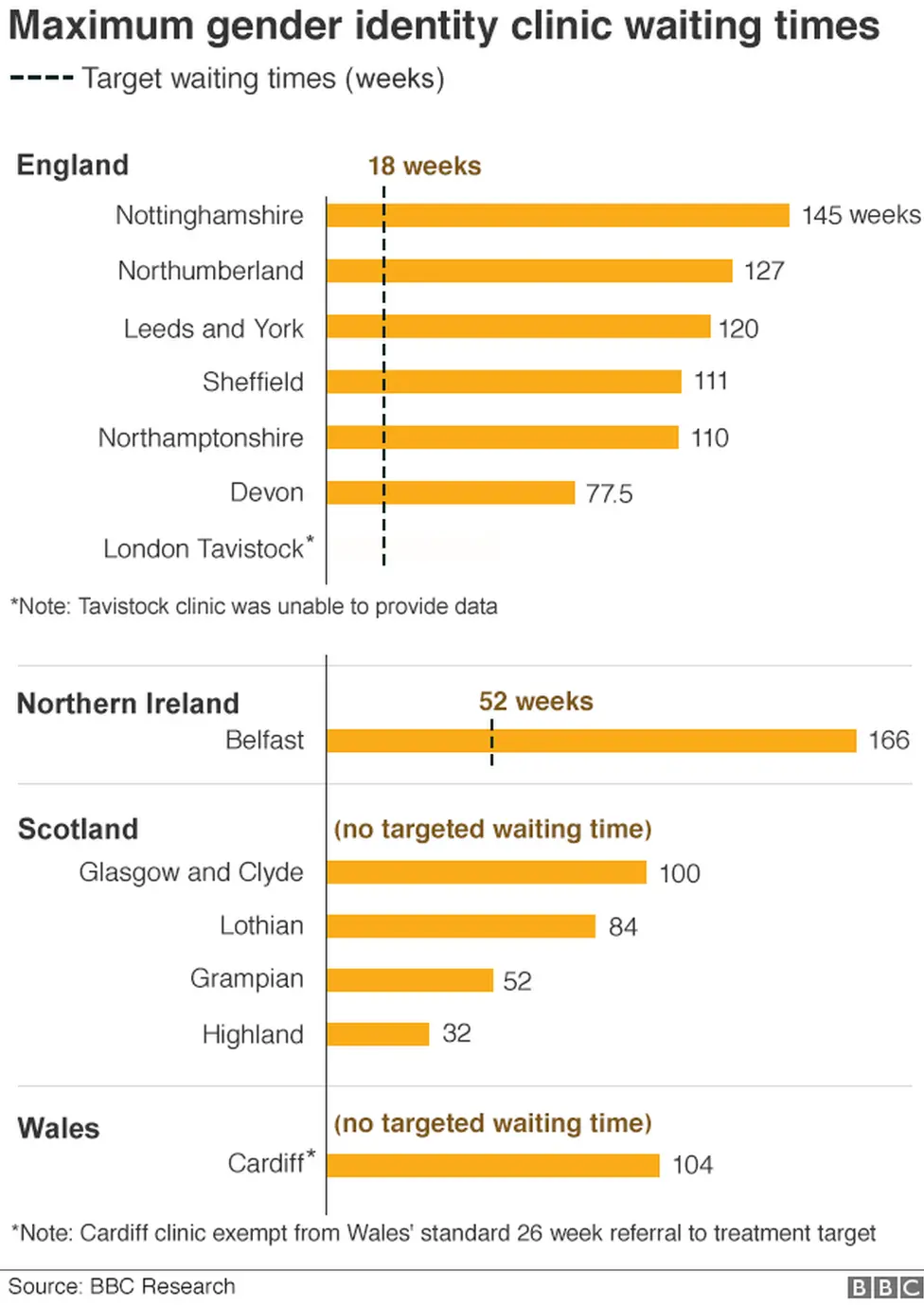Transgender patients self-medicating over NHS waits
 BBC
BBCTransgender patients are choosing to self-medicate with hormones bought online from unregulated sources due to waiting times to see NHS specialists, the BBC has learned.
In many areas, some patients wait over two years to be seen, new figures show. England's target time is 18 weeks.
One woman said she was so low it felt like a choice between self-medicating or suicide.
NHS England said it had increased investment to respond to rising demand.
'Petrified'
Law student Kara told the BBC's Victoria Derbyshire programme she began buying oestrogen - the hormone prescribed to trans women - last summer online, to begin her transition.
She has been on an NHS gender identity clinic waiting list now for two years.
She admitted she was "absolutely petrified" of the effects it could have on her.
Many of the websites selling hormones are not based in the UK - and often ask users to pay by Bitcoin or bank transfer.
"I don't know anything about the tablets [that I buy] specifically, if they are what they say they are," she said. "So it's kind of a guessing game with your life."
She told the BBC she felt the waiting times had "forced" her to make the choice to buy hormones online.
"I was so low before, it basically felt like a choice between suicide or self-medicating, because I couldn't deal with the thought of further masculisation," she added.

One expert, Dr Grainne Coakley, from Sheffield's Gender Identity Clinic, said - with both testosterone and oestrogen tablets - there was an added risk of the clotting of the blood, and also a risk of liver problems.
"If that's not being monitored by a GP, somebody not having regular blood tests, then they are putting themselves at risk."
166-week maximum wait
New figures, from a Freedom of Information request by the Victoria Derbyshire programme, show that in many areas some individuals are waiting over two years to be seen by a specialist, from referral.
Gender identity clinics in Belfast (166 weeks), Nottinghamshire (145 weeks) and Northumberland (127 weeks) have the longest maximum wait times, data suggests.
NHS Highland's gender identity clinic (32 weeks) has the shortest maximum wait.
London's Tavistock clinic was not able to provide accurate figures, but anecdotal evidence points to patients waiting up to two years to be seen.
More than 13,500 transgender and non-binary adults are on waiting lists for NHS gender identity clinics in England, previous BBC research has found.


Lab testing
The Victoria Derbyshire programme bought four testosterone and oestrogen products online, to send to a laboratory for testing.
Only three arrived. One, a testosterone sample, was supposed to be made up of four different types of the drug - but this was not the case, indicating it was a counterfeit product from an unknown source.
Supplying or selling testosterone, a class C drug, is punishable by an unlimited fine or up to 14 years in jail.
But it is not illegal to buy or possess it for personal use, provided it is not brought into the country via the postal system.
Oestrogen is a prescription-only product, but if it is for personal use it can be legally imported without a prescription.
In both cases experts stress it is only safe to use prescribed drugs, under the ongoing supervision of a medical expert.
'Distressing and dehumanising'
Lucas, who began transitioning six years ago aged 29, decided to use testosterone bought online after being told he would face a two-and-a-half year wait for a gender identity clinic appointment.
He said he knows of at least one person who has taken their own life due to the "distressing and dehumanising" wait to be seen.

Lucas described self-medicating as "scary and unpleasant", and believes the quality of the products was notably lower than those he is now prescribed.
"I suspect a few of the doses were effectively nothing,
"For example, I didn't actually start growing any facial hair at all until I moved onto prescribed testosterone."
NHS England told the BBC in a statement: "As more people feel able to seek support and treatment, the demand for gender identity services has greatly increased, and in recent years we've increased investment to respond to the rising demand, with staff working hard to support patients to get the right care as quickly as possible.
"From the spring a new service will be piloted in London that will increase capacity in gender identity services."
It is understood that a lack of medical professionals wanting to specialise in trans healthcare had also added to wait times, for which a new Royal College of Physicians pathway had been established.
A Scottish government spokesman said long waiting times for patients were "unacceptable", but that health professionals were working hard to reduce them.
He added: "Gender identity clinics are a very specialised resource, and while people are waiting to be assessed they still have access to a full range of community mental health and well-being services appropriate to their situation and needs."
NHS Wales and Belfast NHS Trust have not yet responded to requests for comment.

